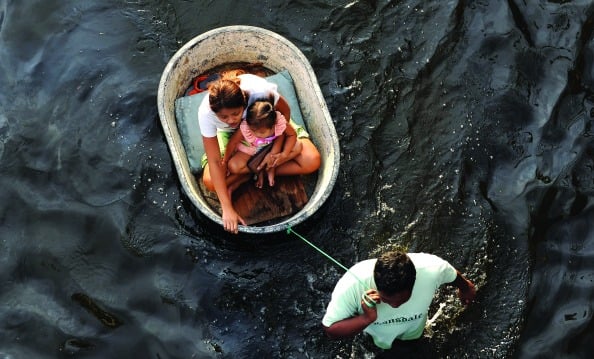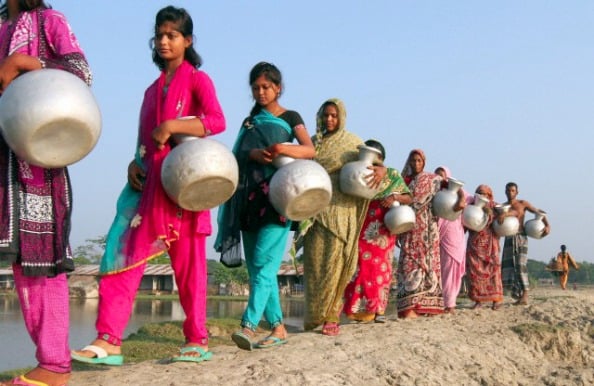The issue of climate change is now unavoidable. Once upon a time, it was seen as a hobby for society-eschewing activists. Campaigns like ‘Save The Whales’ were too intangible, making them easy for people to ignore. Then Vivienne Westwood et al stepped in and the politicking got fashionable. Now it’s not just trendsetters and followers who need to worry, we all do…
The subject of us all having to start waking up to the issue of climate change was made very apparent at the eighth edition of the World Future Energy Summit, recently held on our doorstep in Abu Dhabi. And according to the United Nations, the solution lies with the main victims of climate change: women.
Although greenhouse gases, natural disasters and extreme weather affect every living thing on the planet, there’s no doubt that those in the developing nations are hit hardest. Even minor environmental shifts can devastate communities, mainly because their livelihood is often based solely on natural resources. As women make up the bulk of small-scale farmers, cooks and homemakers in the third world, they’re on the front line of survival.
THE FEMALE FACTOR
“Climate change has the most adverse impact on women in developing countries, where labour and agriculture duties are fundamental,” says Director of Sustainability at Masdar, Dr Nawal Al Hosany. “Women and girls are often responsible for the unpaid tasks around the household.” In simple terms, that means that global warming is drying up water resources, and forcing women to walk increasingly further to find gradually scarce supplies. In some communities, collecting wood to burn is an issue, making it difficult to manage even basic forms of cooking.
The United Nations estimate that in the worst-hit areas, simply collecting natural fuel can take up to 20 hours per week. But that’s minor compared to the scores of people who are forced out of their homes. A paper from UN Women Watch states that severe weather events, shoreline erosion, flooding and droughts have contributed to large-scale human migration.
According to Marie-José Nadeau, Chair of the World Energy Council (WEC), changes to our environment are only part of the problem. “With extreme weather events everything gets worse,” she explains. “But behind climate change is access to electricity. You could have the perfect climate, but if you don’t have access to electricity… and modern forms of cooking, you wont be able to do much in the way of improving your conditions.”
The consequences of this go further than compromised access to food and housing. Without reliable water sources, and no access to electricity, it’s difficult to maintain even a basic level of sanitation. “Women are badly hit by nature’s elements and unforeseen conditions,” says Marie-José. “In many cases women lose their babies because of lack of electricity and energy services.”

A man pulls a plastic tub carrying mother and a child through the floodwaters in Bangkok on November 7, 2011. According to experts, the Thai capital, built on swampland, is slowly sinking and the floods besieging Bangkok could be merely a foretaste of a grim future as climate change makes its impact felt.
HUNGRY FOR CHANGE
Here’s where sustainable energy comes in. Gender equality was high on the agenda at Abu Dhabi’s World Future Energy Summit, not least with the addition of the Women In Sustainability and Renewable Energy Forum. Explaining the importance of forums like this, Marie-José highlights that it’s not just about helping women, it’s about recognising how valuable they are in the fight. “Our world has become so complex in the energy sector that we cannot afford to avoid involving half of the population,” she says.
It seems that climate change charities, government bodies, and energy leaders recognise that women play a pivotal role in their communities – one that positions them perfectly as ambassadors for transformation. Here in the UAE, we’re seeing more and more women involved in every level of the energy sector, but even in third world countries, change is coming.
“Women today have responsibilities in their houses, communities and the workforce,” says Dr Nawal. “A lot of women are mothers, they are educating their kids. The circle of influence that women have on their community is actually much larger than a man’s.”
Dr Nawal is also the director of the Zayed Future Energy Prize, and she’s keen to point out the work they’ve done to contribute to gender parity, help third world countries experiencing climate change, and grow the renewable energy movement. “The Zayed Future Energy Prize, through the awards money, helped to create [groups] around the world to educate women to be solar energy technicians,” she says proudly. “They helped educate them, and gave them the opportunity to be part of the solution to help other women.”
Although it’s obvious that climate change is imbalanced in who it affects, perturbing people based on gender and location, it’s important to remember that none of us can hide. “Changes in nature have serious implications for people,” stresses Dr Nawal. “Just to give you an example, the insurance industry estimate that the economic impact caused by global warming [is] hundreds of billions of dollars every year.” It affects every single person in every single country, with fluctuations to the economy, jeopardising water security, food security, travel, and our children’s future.
Though there is a particular emphasis on women, the general message is one of inclusion. We’re at a stage where we can’t afford to alienate anyone, whatever their gender, race, background or country of origin. We all have a responsibility. “It’s a challenge that we as human beings must take on,” stresses Marie-Jose. “What will we leave to the next generation?”
Images: Corbis & SAEED KHAN/AFP/Getty Images












